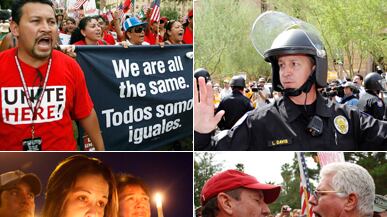Long before Gabrielle Giffords was shot, Arizona politicians from Raúl Grijalva to Sheriff Joe Arpaio received gruesome death threats. Bryan Curtis talks to them about Arizona’s year of terror. Plus, full coverage of the Arizona shooting.
On April 23, 2010, an angry phone call came into a congressman’s office in Tucson, Arizona. The voice on the line was a male, on the young side, brimming with fury over immigration. The caller announced he was going to “come down there and blow the brains out” of the congressman and his staff, an aide later recalled. Then the caller said he would do the same to Mexicans crossing the border. Minutes later, police evacuated the offices of Rep. Raúl Grijalva, a Tucson Democrat whose congressional district sits immediately to the west of Gabrielle Giffords’.

In November, after he won a tight reelection race, I asked Grijalva if he felt the world had gone mad. “Oh, in lots of ways,” he replied. In the past eight months, the 62-year-old congressional brawler had endured three terrorist threats against him or his office. “And we’re not logging or complaining about some of the other vile statements that are made,” Grijalva said.
Arizona has been rocked by threats of violence against its politicians for nearly a year now. Pols have been threatened with death; they’ve had their offices vandalized and shot at; one reportedly even had a $1 million bounty placed on his head. The threats came from diffuse, even contradictory sources. But together they produced an itching fear that long preceded the alleged crimes of Jared Lee Loughner. “I just hope there aren’t any copycats out there to cause harm to others,” says Joe Arpaio, the sheriff of Maricopa County.
As several media outlets reported, the door to Giffords’ Tucson congressional office was vandalized last March after her vote in favor of the health-care bill. But the event that ratcheted up the violent chatter was the April signing of Senate Bill 1070, an Arizona law that gave local police broad powers to discover illegal immigrants.
Just a week before the shooting, Sheriff Arpaio rode in the Fiesta Bowl parade in a police tank. “On top of the tank,” he corrects. “I should be in it.”
Grijalva opposed the law, urging a statewide convention boycott. (Giffords, who is more conservative, also opposed the law but didn’t go along with Grijalva’s boycott.) The same week Jan Brewer signed the bill, Grijalva’s office received the threatening call. Police later arrested Justin Haynes, 31, who in June was indicted by a federal grand jury. In July, someone shot out the window of Grijalva’s Yuma office. Grijalva had bulletproof glass installed. In October, a bag of white powder was mailed to Grijalva’s Tucson office in a package decorated with swastikas. Again, police ordered his staff home. The FBI later said the powder wasn’t toxic.
Susan Bolton, the federal judge who struck down large parts of SB 1070, was threatened, too. Describing the mail Bolton was receiving, a U.S. marshal told a local paper: “About 99.9 percent of the inappropriate comments are people venting. They are exercising their First Amendment rights and a lot of it is perverted. But it’s that 0.1 percent that goes over the line that we are taking extra seriously.”
If SB 1070 produced a wave of threats for those who opposed it, the bill’s supporters claimed they were receiving savage messages of their own. It was as if another, separate strain of violence was creeping into Arizona. Paul Babeu is the sheriff of Pinal County and an outspoken supporter of 1070. Over the summer, he got a call. “We had what law enforcement termed credible threats made against me from the Mexican mafia,” Babeu says.
“It was a ‘green light,’” he continues, meaning that in the tradition of the Italian mafia, “somebody is basically instructed to take somebody out.” The latter somebody was Sheriff Babeu.
Babeu refused to add a security detail. “I’m always armed and nearly always in uniform,” he says. But he’d already been taking a special interest in the safety of his local congressman as the political debates in Washington heated up.
In 2009, Babeu hosted a town-hall meeting for Jeff Flake, the Republican representative from the Phoenix suburbs, in Chandler, Arizona. As more than 1,000 constituents piled into local high school, about 15 sheriff’s deputies and local policeman monitored the crowd. Babeu, who was armed, stayed close to Flake for the entire event. It went off without incident. Less than an hour after the Giffords shooting Saturday, Flake was on the phone with the sheriff again asking whether it was safe for him to go to Tucson to show his support for Giffords.
If there is a magnet for anger in Arizona, it is the office of Arpaio, the Maricopa County sheriff known for his brutal treatment of illegal immigrants. Last August, a text message in Spanish was allegedly sent to various parties offering a $1 million bounty for Arpaio’s death. “That doesn’t bother me,” Arpaio says when I reach him at his office. He took the threat seriously ( some didn’t) but he refused to let it get him down.
Sheriff Joe is nothing if not a public figure, and he insists the Giffords shooting won’t alter his routine. Just a week before the shooting, he rode in the Fiesta Bowl parade in a police tank. “On top of the tank,” he corrects. “I should be in it.” I ask Arpaio what kind of security detail he keeps as travels around Arizona. He replies, “Who says I have security?” Well, he admits after a time, two guys are with him once in a while. Is he armed at all times? Arpaio hedges and then admits that he isn’t.
Sheriff Joe says another death threat came into his office from south of the border just a month ago. “I got another one from Mexico recently, the cartel,” he says. What would Arpaio do now? “What do you do—stop? I’m a cop.”
“That’s just the nature of doing business,” he adds.
Bryan Curtis is a national correspondent at The Daily Beast. He was a columnist at Play: The New York Times Sports Magazine, Slate, and Texas Monthly, and has written for GQ, Outside, and New York. Write him at bryan.curtis at thedailybeast.com.





